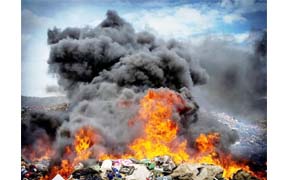WE would like to look at a few innocent daily activities. We are moving – or attempting to move – towards a paperless economy.
Nevertheless, along the course of conducting our daily business, both at the workplace and at home, we find ourselves inundated with bits and pieces of excess paper.
Receipts, wrappers, old newspapers, discarded cartons and so on.
When we do clean ups, we heap these pieces of paper in one place and burn them.
Naturally…
In compounds like the one I grew up in, one daily early morning exercise is sweeping the yard.
Our mothers and sisters sweep the yards clean – they do not want to see a single leaf or any other type of litter lying around.
All the sweepings are heaped in one corner and burnt.
Naturally….
Similarly, when men and boys cut hedges, they heap the offcuts in a corner and burn them.
Naturally….
Currently, it is ploughing and planting season.
As our farmers go about cultivating their land, they churn out some residue – leaves, twigs,
shrubs, branches.
They heap these in lots and burn them.
Naturally….
We are entering the rain season.
This is a period of rapid and bounteous growth of vegetation.
Soon there will be thick bushes everywhere.
After the season, as we go towards the middle of the year, the vegetation will dry.
To clear the wild growths, a lot of fires are set off.
Naturally….
The question is, what is the cost of all this casual burning activity?
We already have the problem of burning fossil fuels at industrial level.
This is a matter we have addressed ourselves to recently.
Is this any different?
Unfortunately, no.
The effects are exactly the same.
All this burning releases greenhouse gases like carbon dioxide and nitrous oxide into the atmosphere.
These greenhouse gases can remain in the atmosphere anywhere from a few decades to hundreds of years.
The airborne particles increase reflectivity of the atmosphere, meaning they reflect a lot of sunlight back into space while encouraging more cloud formation and increasing global warming.
Inevitably, this has an adverse effect on climate.
Snow is melted in our glacial regions.
We begin getting acid rain because of too many suspended particles of sulphur dioxide, carbon dioxide and nitrogen oxides.
Acid rain contaminates fresh water sources, resulting in harmful algal blooms.
Water oxygen levels reduce drastically harming fish and other wildlife.
Acid rain also drastically increases weathering of rock and even man-made structures.
It is a disaster all round.
The immediate effect of burning which we have all personally experienced is poor air quality and poor visibility.
The more sensitive or medically-prone among us will even choke or cough uncontrollably.
And yet, those casually burning materials appear not bothered at all… naturally!
As we can see, the cost is huge.
Everybody loses, the whole world loses.
However, this cost can easily be turned into profitable investment.
We need to change our mindset; replace perception “waste” with perception “input.”
The leaves, grass and twigs we burn every day in our yards should actually be recycled back into the soil.
That is free fertiliser for our gardens (the reason why garbage dumps produce very healthy wild vegetables such as bondwe).
That will immediately meet our domestic needs, and we can even produce some healthy vegetables for sale.
The same should be practiced on our farms.
It is a huge irony that our small-scale farmers burn their vegetation – actually burning away free fertiliser – then jostle for inferior chemical fertiliser which they willingly even spend money on.
A big mindset switch is also needed here.
The combination of animal manure and compost on a farm is unbeatable.
It is not only commercially viable but most beneficial to humans as well as soil health.
For non-biodegradable waste such as paper or plastic, we have previously discussed re-cycling and re-use.
There are many innovative and even profitable uses to which this waste can be put, both at domestic and commercial level.
There are a thousand uses for discarded paper in the home, grass and twigs can be turned into charcoal briquettes.
We have recently learned of an innovative young lady entrepreneur in Lusaka who is making pavers from recycled plastic bags.
All these are examples and pointers.
The big starting point is re-education.
We must find a way of changing the general psyche on the issue of burning.
How do we ensure “burn” is not the first thing that comes to anybody’s mind when they see rubble or any other kind of waste?
Only via re-orientation.
There is already legislation to discourage burning but it is evidently of no impact at all.
Let us put this in our school syllabi.
If our little ones grow up correctly oriented, we can have great hope of eliminating this problem with the next generation.
For now, let us start with you, dear reader.
Discard “burn” from your thoughts and vocabulary! We do need it for a better planet.
For comments via email misheck3@live.com via voice, sms or WhatsApp 0977796563








